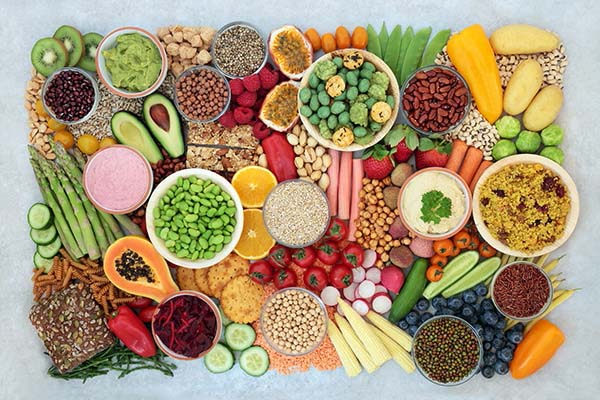A Beginner’s Guide to Cooking With Plant Based Chicken at Home
A Beginner’s Guide to Cooking With Plant Based Chicken at Home
Blog Article
All About Healthy And Balanced Food: Benefits of Enjoying Plant Based Options
The conversation surrounding plant-based diet regimens has actually gotten substantial attention in the last few years. Lots of people are checking out the potential health and wellness benefits, nutritional benefits, and ecological impacts connected with these dietary choices. As individuals come to be extra familiar with their food's influence on wellness and sustainability, concerns occur regarding the usefulness of embracing such a way of living. What specific modifications can one anticipate, and how might these selections reshape not just personal wellness but likewise the earth's future?
Recognizing Plant-Based Diet Plans
Many individuals associate plant-based diet regimens mainly with vegetarianism or veganism, these diet plans can incorporate a vast range of consuming patterns that prioritize entire, minimally processed plant foods. Such diets usually include fruits, veggies, entire grains, legumes, seeds, and nuts, while limiting or removing animal products. This versatility allows people to tailor their nutritional options according to individual choices and dietary requirements. Some might adopt a mostly plant-based diet regimen while still occasionally consuming meat or milk, typically referred to as a flexitarian technique. The focus remains on including even more plant foods, which can result in a diverse selection of meals and tastes. Recognizing these numerous interpretations of plant-based eating is necessary for valuing its ease of access and charm in modern food society.
Wellness Advantages of Plant-Based Foods
The health benefits of plant-based foods are significant, providing a nutrient density advantage that sustains overall health. Study suggests that these foods can enhance heart health and play a vital function in reliable weight administration. By incorporating extra plant-based choices, people might boost their nutritional choices and promote long-term health and wellness.
Nutrient Thickness Benefit
Nutrient density plays a necessary role in the health benefits of plant-based foods, making them an engaging selection for those looking for a well balanced diet. Plant-based foods, such as fruits, vegetables, vegetables, nuts, and whole grains, are usually abundant in important vitamins, minerals, and anti-oxidants while being lower in calories. This high nutrient thickness allows individuals to take in less calories while still fulfilling their dietary needs. Additionally, these foods are loaded with nutritional fiber, promoting digestion health and wellness and assisting in weight management. By incorporating nutrient-dense plant-based options, customers can enhance their general wellness, support their immune systems, and reduce the danger of persistent illness. Ultimately, the nutrient thickness of plant-based foods highlights their relevance in a health-conscious way of living.
Heart Health Enhancement

Weight Administration Assistance
Along with advertising heart health, a plant-based diet plan can significantly help in weight administration. This nutritional technique stresses whole foods such as fruits, veggies, vegetables, nuts, and entire grains, which are usually reduced in calories and greater in fiber contrasted to animal-based products. The high fiber material assists increase satiety, lowering total calorie intake. Plant-based diet regimens are commonly abundant in important nutrients while low in harmful fats, making it much easier to keep a healthy weight. Study indicates that individuals that adopt a plant-based way of living have a tendency to have reduced body mass indexes (BMIs) and experience even more successful weight loss compared to those that eat meat-heavy diets. Embracing plant-based choices is a tactical selection for reliable weight administration.
Nutritional Value of Plant-Based Ingredients
Plant-based components are rich in important nutrients, supplying a varied variety of vitamins, minerals, and anti-oxidants that contribute to total wellness. A contrast of healthy protein sources discloses that while animal items are frequently deemed remarkable, many plant-based alternatives provide sufficient healthy protein and other valuable compounds. Recognizing the nutritional worth of these ingredients can aid people make educated dietary options.
Essential Nutrients in Plants
Nutrient-rich ingredients found in plants supply a varied variety of essential vitamins and minerals that add significantly to overall health and wellness. These active ingredients are abundant in vitamins A, C, and K, which support immune feature, vision, and blood clot, specifically. In addition, plants offer essential minerals such as potassium, magnesium, and calcium, important for heart health and wellness, muscular tissue feature, and bone stamina. The existence of fiber in plant-based foods aids food digestion and promotes a healthy and balanced digestive tract microbiome. Antioxidants, discovered generously in vegetables and fruits, assistance battle oxidative stress and anxiety and lower swelling. Furthermore, lots of plant foods are low in calories yet high in nutrients, making them an exceptional choice for those seeking to keep a healthy weight while making certain ideal nutrient consumption.
Comparing Healthy Protein Resources
Healthy protein sources differ substantially in their nutritional accounts, with plant-based ingredients offering one-of-a-kind benefits. Unlike pet healthy proteins, which commonly include hydrogenated fats and cholesterol, plant proteins tend to be lower in these unhealthy elements. Legumes, nuts, seeds, and whole grains are rich in necessary amino acids, fiber, vitamins, and minerals. Lentils supply high protein web content alongside significant iron and folate, while quinoa is a total healthy protein, using all nine necessary amino acids. Furthermore, plant-based healthy proteins are typically accompanied by antioxidants and phytochemicals that sustain overall health. The change to plant-based protein resources not just improves nutritional consumption but also straightens with sustainable nutritional methods, reducing environmental impact and advertising lasting wellness benefits.
Environmental Effect of Plant-Based Consuming
As awareness of environment modification expands, numerous individuals are discovering lasting nutritional selections that can significantly reduce their environmental impact. Plant-based eating has arised as a considerable contributor to decreasing greenhouse gas emissions, which are largely connected with livestock manufacturing. The farming of fruits, grains, legumes, and vegetables generally calls for fewer sources, such as water and land, contrasted to animal farming. In addition, plant-based diet plans can bring about reduced deforestation, as much less land is required for grazing animals or growing animal feed. By shifting in the direction of plant-based choices, customers can support biodiversity and promote much healthier communities. Overall, accepting plant-based eating not just benefits individual health and wellness however additionally represents an important action towards ecological sustainability and conservation initiatives.
Conquering Common Misconceptions
While numerous individuals recognize the advantages of a plant-based diet regimen, a number of mistaken beliefs typically deter them from totally embracing this way of living. An usual belief is that plant-based diet plans do not have enough protein; nonetheless, countless plant sources, such as legumes, nuts, and tofu, provide ample healthy protein. In addition, some think that this diet regimen is expensive, when actually, staples like beans, rice, and seasonal vegetables can be fairly inexpensive. An additional misunderstanding is that plant-based eating is excessively restrictive, whereas it actually offers a diverse selection of foods and tastes. Numerous worry that a plant-based diet plan might lead to deficiencies, yet with proper planning, individuals can obtain all essential nutrients, including minerals and vitamins, while appreciating a large range of scrumptious meals. Large Tips for Transitioning to a Plant-Based Way of living
Making the change to a plant-based lifestyle can be an enhancing experience, though it commonly requires some assistance to browse the initial changes. People are encouraged to begin gradually, incorporating more fruits, vegetables, legumes, and entire grains right into their dishes while reducing meat and milk consumption. Meal planning is essential; preparing an once a week menu can aid reduce the modification and prevent last-minute unhealthy selections. Discovering cooking approaches and brand-new dishes can likewise keep and boost the experience enjoyment about plant-based eating. Furthermore, joining support groups or communities can supply inspiration and share valuable ideas. Lastly, remaining informed about nourishment assurances balanced meals, preventing shortages while promoting a healthy, rewarding plant-based way of living.
Delicious Plant-Based Dish Ideas
Discovering tasty plant-based meal ideas can influence individuals her response to accept an extra nourishing diet. One prominent choice is a passionate quinoa salad, featuring cherry tomatoes, cucumber, and a tangy lemon-tahini dressing. One more fave is a full-flavored lentil stew, packed with carrots, celery, and fragrant natural herbs, excellent for a comforting dinner. For breakfast, over night oats made with almond milk, chia seeds, and topped with fresh berries provide a healthy begin to the day. Furthermore, a lively vegetable stir-fry with tofu and a selection of vibrant veggies can be a quick yet pleasing meal. Luscious avocado salute on whole-grain bread, sprayed with seeds and seasonings, supplies a basic yet delicious snack. These meals showcase the selection and richness of plant-based eating.

Frequently Asked Questions
Can a Plant-Based Diet Regimen Supply Enough Healthy Protein?
The inquiry of whether a plant-based diet plan can supply adequate protein is common. Various resources, consisting of beans, nuts, seeds, and whole grains, can fulfill healthy protein requires efficiently, Learn More sustaining a balanced and nourishing diet for people.
Are Plant-Based Diet Plans Ideal for Kid?
The viability of plant-based diet regimens for kids relies on cautious planning. Ample nutrients should be assured, including healthy proteins, minerals, and vitamins. With correct guidance, such diet regimens can support healthy and balanced growth and growth in kids.
Exactly how Do I Dine Out on a Plant-Based Diet?
Eating in restaurants on a plant-based diet regimen involves seeking restaurants with varied food selections, requesting for alterations, and checking out vegan-friendly options. Planning in advance and communicating nutritional preferences can improve the eating experience while preserving dietary choices.
What Prevail Allergens in Plant-Based Foods?
Usual irritants in plant-based foods include soy, gluten, nuts, and seeds - BBQ Sauces. Individuals complying with a plant-based diet plan needs to know these irritants and read labels thoroughly to avoid damaging responses and ensure safe intake
Can Plant-Based Diets Aid With Weight Loss?
Research study suggests that taking on a plant-based diet regimen may facilitate weight-loss due to its usually reduced calorie thickness and higher fiber content. This combination can enhance satiety, helping people handle their caloric intake efficiently. Numerous people connect plant-based diets generally with vegetarianism or veganism, these diets can incorporate a broad variety of eating patterns that focus on entire, minimally refined plant foods. Nutrient thickness plays a necessary role in the health and wellness benefits of plant-based foods, making them a compelling selection for those looking for a balanced diet plan. Plant-based diet regimens have been shown to significantly improve heart health, as they often contain aspects that sustain cardiovascular feature. In enhancement to promoting heart health and wellness, a plant-based diet plan can substantially assist in weight monitoring. A description common belief is that plant-based diet regimens lack adequate healthy protein; nevertheless, many plant sources, such as legumes, nuts, and tofu, give sufficient protein.
Report this page